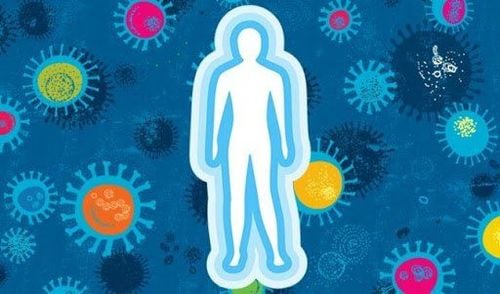This is an automatically translated article.
Good sleep plays an extremely important role in your health. In fact, it's just as important as a healthy diet and exercise. However, there are many things that can affect natural sleep. People are now sleeping less than they used to, and the quality of sleep is also decreasing.
1. Why is good sleep important to health?
A good night's sleep plays an extremely important role in your health. Here are 10 reasons why a good night's sleep is important.
1.1. Poor sleep linked to weight gain
Poor sleep is closely associated with weight gain. People who get less sleep tend to weigh significantly more than those who get enough sleep. In fact, short sleep duration is one of the highest risk factors for obesity.
In an extensive review of both children and adults, shorter sleep durations had an 89% and 55% higher risk of obesity, respectively.
The effect of sleep on weight gain is thought to be mediated by many factors, including hormones and motivation to exercise. If you're trying to lose weight, getting enough sleep is extremely important.
1.2. People who sleep well tend to eat less
Studies have shown that sleep-deprived people have more cravings and tend to eat more.
Sleep deprivation disrupts daily fluctuations in appetite hormones and is thought to be responsible for poor appetite regulation. This includes higher levels of ghrelin, the appetite-stimulating hormone, and reduced levels of leptin, the hormone that suppresses appetite.
1.3. Good sleep can help improve concentration and work productivity
Sleep is important for brain function, including cognition, concentration, productivity and brain performance. All of these are negatively affected by sleep deprivation.
A study of medical interns provides a prime example. Traditionally scheduled interns with more than 24 hours of work made 36% more serious medical errors than interns given more sleep.
Another study found that napping can negatively impact some aspects of brain function to the same extent as binge drinking.
On the other hand, good sleep has been shown to improve problem-solving skills and enhance memory performance in both children and adults.
1.4. Good sleep can improve athletic performance
Sleep has been shown to enhance athletic performance. In a study of basketball players, longer sleep was shown to significantly improve speed, accuracy, reaction time, and mental health.
Less sleep duration is also associated with poorer exercise performance and functional limitations in older women. A study of 2,800 women found that poor sleep was associated with slower walking, lower grip strength, and more difficulty performing independent activities.

Giấc ngủ đã được chứng minh là giúp tăng cường hiệu suất hoạt động thể thao
1.5. Poor sleep linked to higher risk of heart disease and stroke
The quality and duration of sleep can greatly influence many health risk factors. These are factors that are thought to lead to chronic diseases, including heart disease.
A review based on 15 studies found that people who don't get enough sleep have a much higher risk of heart disease or stroke than those who sleep 7-8 hours a night.
1.6. Sleep affects glucose metabolism and type 2 diabetes risk
Sleep restriction experimentally affects blood sugar and reduces insulin sensitivity.
In a study in young healthy men, sleep restriction to 4 hours per night for 6 consecutive nights induced symptoms of prediabetes. These symptoms resolved after a week of increased sleep time.
Poor sleep habits are also closely related to the negative impact on blood sugar levels of the general population. People who sleep less than 6 hours a night repeatedly have been shown to have a higher risk of type 2 diabetes.
1.7. Poor sleep linked to depression
Mental health problems, such as depression, are closely related to sleep quality and sleep disorders. It is estimated that 90% of people with depression complain of sleep quality.
Poor sleep has even been linked to an increased risk of death from suicide. People with sleep disorders such as insomnia or sleep apnea have significantly higher rates of depression than those without insomnia.
1.8. Good sleep improves your immune function
Even a little sleep loss has been shown to impair immune function. One large two-week study tracked the development of the common cold after giving people nasal drops with a cold virus.
They found that people who slept less than 7 hours were almost 3 times more likely to catch a cold than those who slept 8 hours or more. If you frequently catch colds, making sure you get at least 8 hours of sleep every night can be very helpful.

Mất ngủ một chút cũng có thể làm suy giảm chức năng miễn dịch
1.9. Poor sleep linked to increased inflammation
Sleep can have a big effect on inflammation. In fact, sleep loss is known to trigger unwanted markers of inflammation and cell damage.
Poor sleep is strongly linked to long-term inflammation of the digestive tract, in disorders known as inflammatory bowel disease. One study observed that sleep-deprived people with Crohn's disease were twice as likely to have a relapse than patients who slept well.
Researchers even recommend sleep assessments to help predict outcomes in people with long-term inflammatory problems.
1.10. Sleep affects your emotions and social interactions
Insomnia will decrease your social interaction. Several studies have confirmed this using facial emotion recognition tests.
One study found that people who don't sleep have a reduced ability to recognize expressions of anger and happiness. Researchers believe that poor sleep affects the ability to recognize important social cues and process emotional information.
2. How much sleep do you need?
Our sleep habits and sleep needs change as we age. According to recommendations from the National Sleep Foundation, the best sleep duration is:| Tuổi tác | Khuyến nghị về giấc ngủ |
| 65 trở lên | 7 đến 8 giờ |
| 18 đến 64 tuổi | 7 đến 9 giờ |
| 14 đến 17 tuổi | 8 đến 10 giờ |
| 6 đến 13 tuổi | 9 đến 11 giờ |
Younger children need more sleep. Many children will achieve their sleep goals with the help of naps.
| Tuổi tác | Khuyến nghị về giấc ngủ |
| 3 đến 5 tuổi | 10 đến 13 giờ |
| 1 đến 2 tuổi | 11 đến 14 giờ |
| 4 đến 11 tháng tuổi | 12 đến 15 giờ |
| 0 đến 3 tháng tuổi | 14 đến 17 giờ |
Several factors influence how much sleep you need. Genetics can determine how long you sleep. Your genes may also play a role in how you respond to sleep deprivation.
Likewise, sleep quality is also a determining factor in how much sleep you need each night. People who get quality sleep without waking may need slightly less sleep than those who wake up frequently or have trouble falling asleep.
3. Tips and tricks to help you get a good night's sleep
Healthy sleep can trick your body (and brain) into better, longer rest and more recovery. Here are some ideas to increase sleep quality and length:
Follow a regular sleep schedule: Go to bed and wake up at the same time every day, even on weekends or when traveling. Avoid sleeping in the late afternoon or evening, if you can: Naps can keep you awake at night, making it harder for you to get a good night's sleep. Build a bedtime routine: Take time to relax before bed each night. Some people read a book, listen to soothing music, or soak in a warm bath. Try not to watch TV or use a computer, cell phone, or tablet in your bedroom: The light from these devices can make it difficult to fall asleep. And alarming or disturbing shows or movies, such as horror movies, can keep you awake. Keep your bedroom at a comfortable temperature, not too hot or too cold, and as quiet as possible. Use low light in the evening and when you are about to go to bed. Exercise regularly every day, but do not exercise within 3 hours of bedtime. Avoid eating large meals near bedtime, as they can keep you awake. Stay away from caffeine late in the day. Caffeine (found in coffee, tea, soda, and chocolate) can keep you awake and make it difficult to fall asleep. Remember alcohol won't help you sleep: Even small amounts make it harder to fall asleep. Do not keep pets in the bedroom: You may enjoy sleeping with pets. But research shows that pet owners who let their pets sleep with them experience more sleep disruption and lower sleep quality.

Tránh xa caffeine vào cuối ngày vì nó có thể khiến bạn tỉnh táo và khó đi vào giấc ngủ
4. Sleep disturbance
A sleep disorder is a condition in which you cannot sleep well on a regular basis. Sometimes certain conditions like plane delays, stress and busy schedules can affect your sleep. However, if your sleep is disturbed frequently, it could be a sign of a sleep disorder.
Some common sleep disorders include:
Insomnia
Insomnia is the most common sleep problem in adults 60 years of age and older. Insomnia can last for days, months, or even years. Having trouble sleeping can mean you:
Takes a long time to fall asleep Waking up many times during the night Waking up early and not being able to go back to sleep Waking up tired Feeling very sleepy during the day Day Sleep Apnea
This is a sleep disorder that occurs when your airways are interrupted intermittently during sleep. People with sleep apnea have brief pauses in breathing while they are asleep. These pauses in breathing can occur several times during the night. If left untreated, sleep apnea can lead to other problems, such as high blood pressure, stroke, or memory loss.
Narcolepsy is related to daytime "sleep attacks", which are characterized by suddenly feeling very sleepy or falling asleep without warning. Restless legs syndrome (RLS) is the feeling that you need to move your legs constantly, even when you're sleeping. Parasomnias are unusual behaviors or movements during sleep, such as nightmares and sleepwalking. The quality of sleep is just as important as the amount of sleep. Many people suffer from sleep disturbances, where they get enough sleep but don't reach the stage of deep enough sleep to feel comfortable and refreshed in the morning. Having to wake up frequently at night for whatever reason can keep you from reaching important stages of sleep.
Sleep disturbances may be a symptom of an underlying medical condition that requires treatment. When these conditions are thoroughly treated, you can get a good night's sleep.
At the forefront of applying many modern stem cell and gene technologies, and owning the most modern and closed tissue bank in Vietnam today, Vinmec is conducting storage and isolating stem cell cultures. Tissue from different sources, including adipose tissue - which is a "discarded" product after cosmetic liposuction - used in treatment and beauty.
With the solid foundation of people and technology mentioned above, Vinmec will soon be able to provide comprehensive and truly useful healthcare solutions that many Vietnamese people are looking for.
Please dial HOTLINE for more information or register for an appointment HERE. Download MyVinmec app to make appointments faster and to manage your bookings easily.
References: nia.nih.gov, healthline.com













